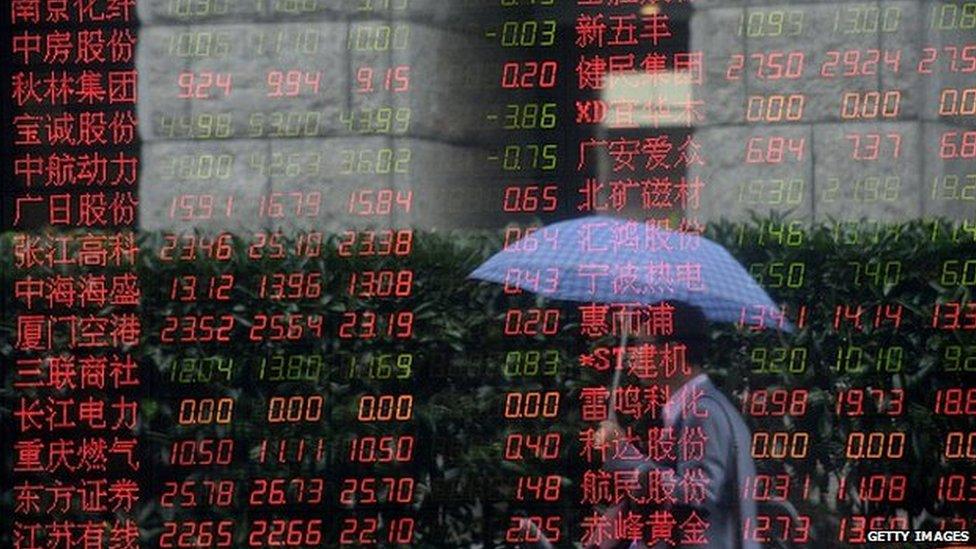China media: Negative market sentiment 'exaggerated'
- Published

China's market regulator has introduced new rules in the past week to try and relieve pressure on Chinese shares
State-run media continue to try to calm investors as Beijing implements measures to stop volatile trading on China's stock markets.
Around 1,300 companies have stopped trading on the stock market in recent days to avoid losses.
A commentary in Xinhua's Economic Information Daily, external says investors' negative sentiment in recent days is "exaggerated".
"We believe that impact on the whole economy caused by the current stock market upheaval is limited. Chances of it turning into a systemic financial crisis is very minimal," notes the article.
It explains that the losses incurred by financial institutions, "even in very extreme circumstances", are "within acceptable range which will not cause much hurt" to the economy.
It adds that the government has intervened to save the stock market and "calm will eventually be restored".
'Restore confidence'
Noting that the stock market did not rebound on Wednesday even after the government's intervention, the People's Daily, external, the flagship newspaper of the Communist Party, urges "rationality and calm", while pointing out that "rumours" and "panic" have been driving sentiments.
The article argues that China's economy remains stable and highlights that "the stock market's bad performance does not mean China's economy is bad".
Pointing out that the government "still has room to stabilise the market", the commentary urges the authorities to "restore confidence".
Other papers have echoed similar sentiments.
The Beijing Times, external highlights that "major shareholders in listed companies will not sell off their share within the next six months".
According to the report, a total of 111 state-owned enterprises have pledged not to reduce their holdings in different firms.
A commentary in the Beijing News , externalsays that despite the risks, the fundamentals of the Chinese economy "remain unchanged and are getting stronger".
"The downward pressure faced by the Chinese economy is part of growing pains," it says.
The Meizhou Daily, a paper in southern Guangdong province, quote experts as saying that the stock market "will become stable in the future".
An investment consultant tells the paper that investors need to wait for the market to "bottom out and eventually increase their holdings".
Various online financial news platforms, including China Finance Information, external and China Fund Online, external, quotes investment guru Jim Rogers as saying that he is "buying more stocks and not selling any".
'Opposing ideologies'
Papers in Hong Kong, however, cast doubts over the government's attempts to prevent the market from going into free-fall.
The Ming Pao daily, external worries that the intervention will do more harm than good.
"The prices set by the authorities may not be accepted by the market. As such, the market seems weaker," notes the daily.
A commentary in the South China Morning Post agrees, noting that the government intervention has "raised doubts over the leadership's willingness to embrace Western-style capitalism".
The article, titled "The visible hand: how far will China go to embrace the free market?", states that China has "never drawn a clear line in the choice between a Maoist command economy and the free market".
"The central government continues to embrace some elements of the free economy, but the latest intervention shows that it is still walking a tightrope between the two opposing ideologies," says the paper.
BBC Monitoring reports and analyses news from TV, radio, web and print media around the world. For more reports from BBC Monitoring, click here. You can follow BBC Monitoring on Twitter, external and Facebook, external.